Next 25 Years Will Bring Unprecedented Changes, Ray Kurzweil Tells 361° Symposium
October 5, 2002
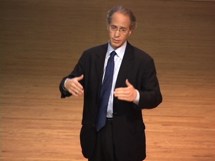 October 5, 2002, Greencastle, Ind. - The pace of progress is accelerating -- doubling every decade -- and that will have profound implications on the way we live our lives in the not-too-distant future, Ray Kurzweil told an audience at DePauw University's Kresge Auditorium this morning. Kurzweil, an internationally-renowned expert on artificial intelligence and best-selling author, provided the keynote address for the 361° symposium, "Beyond e: After the Shakeout, the Real Revolution."
October 5, 2002, Greencastle, Ind. - The pace of progress is accelerating -- doubling every decade -- and that will have profound implications on the way we live our lives in the not-too-distant future, Ray Kurzweil told an audience at DePauw University's Kresge Auditorium this morning. Kurzweil, an internationally-renowned expert on artificial intelligence and best-selling author, provided the keynote address for the 361° symposium, "Beyond e: After the Shakeout, the Real Revolution."
![]() [DOWNLOAD VIDEO: "361°" 388KB] "I'd like to talk to you about the future of technology in the spirit of the 361° initiative which is, by the way, very impressive and should prepare DePauw students very well for what is going to continue to be a very accelerating future," Kurzweil said as he took the stage.
[DOWNLOAD VIDEO: "361°" 388KB] "I'd like to talk to you about the future of technology in the spirit of the 361° initiative which is, by the way, very impressive and should prepare DePauw students very well for what is going to continue to be a very accelerating future," Kurzweil said as he took the stage.
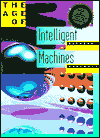 He told the audience of DePauw students, faculty members and technology leaders from across the state and nation that the world has always changed, but the changes were less perceptible in the past, because they took longer to occur.
He told the audience of DePauw students, faculty members and technology leaders from across the state and nation that the world has always changed, but the changes were less perceptible in the past, because they took longer to occur. ![]() [DOWNLOAD AUDIO: "A Changing World " 793KB] "People didn't realize there was change at all: their grandparents lived the same lives they did, they expected their grandchildren to do the same." The futurist says "that started to noticeably change when the weavers in the early 19th century who had enjoyed a centuries-long guild of weaving fabrics in an old-fashioned way... that whole business model was turned on its head with the introduction of automation in the English textile industry and the launching of the industrial revolution."
[DOWNLOAD AUDIO: "A Changing World " 793KB] "People didn't realize there was change at all: their grandparents lived the same lives they did, they expected their grandchildren to do the same." The futurist says "that started to noticeably change when the weavers in the early 19th century who had enjoyed a centuries-long guild of weaving fabrics in an old-fashioned way... that whole business model was turned on its head with the introduction of automation in the English textile industry and the launching of the industrial revolution."
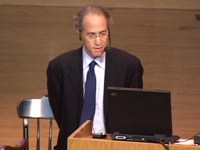 Kurzweil's models, which show the pace of change (or "paradigm shift rate") doubling every ten years, suggest
Kurzweil's models, which show the pace of change (or "paradigm shift rate") doubling every ten years, suggest ![]() [DOWNLOAD AUDIO: "Paradigm Shift Rate" 692KB] "the whole 20th century was actually not 100 years of progress at today's rate of progress. It was 20 years of progress at today's rate of progress. And we'll make another 20 years of progress at today's rate of progress, equivalent to the whole 20th century, which was no slouch for change, in another 14 years. And then we'll do it again in 7 years. That pace will continue to accelerate, and because of the explosive nature of exponential growth, the 21st century will be equivalent to 20,000 years of progress at today's rate of progress; about 1,000 times greater than the 20th century," he said.
[DOWNLOAD AUDIO: "Paradigm Shift Rate" 692KB] "the whole 20th century was actually not 100 years of progress at today's rate of progress. It was 20 years of progress at today's rate of progress. And we'll make another 20 years of progress at today's rate of progress, equivalent to the whole 20th century, which was no slouch for change, in another 14 years. And then we'll do it again in 7 years. That pace will continue to accelerate, and because of the explosive nature of exponential growth, the 21st century will be equivalent to 20,000 years of progress at today's rate of progress; about 1,000 times greater than the 20th century," he said.
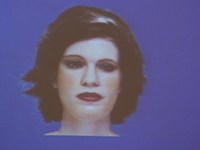 Kurzweil, whose presentation included interactions with his "virtual assistant," Ramona (see "her" here:
Kurzweil, whose presentation included interactions with his "virtual assistant," Ramona (see "her" here: ![]() [DOWNLOAD VIDEO: "Ramona" 456KB] ), says humans have the ability to expand their horizons, which other creatures lack. As a result of the changes,
[DOWNLOAD VIDEO: "Ramona" 456KB] ), says humans have the ability to expand their horizons, which other creatures lack. As a result of the changes, ![]() [DOWNLOAD AUDIO: "Human Uniqueness" 371KB] "our life expectancy didn't remain fixed... it was 37 years at the beginning of the 19th century, we didn't stay on the ground, we didn't stay on the planet, we're not now limiting ourselves to the limitations of our biology."
[DOWNLOAD AUDIO: "Human Uniqueness" 371KB] "our life expectancy didn't remain fixed... it was 37 years at the beginning of the 19th century, we didn't stay on the ground, we didn't stay on the planet, we're not now limiting ourselves to the limitations of our biology."
By 2010, Ray Kurzweil predicts computers will disappear. Images will be written directly to our retinas, and we'll be constantly logged on to the Internet through high bandwidth, wireless connections. Tiny electronics will be embedded in our clothing and in the environment, he says. The challenge that will remain will be to make computers "think" like the human brain. ![]() [DOWNLOAD AUDIO: "Reverse-Engineering the Brain" 396KB]
[DOWNLOAD AUDIO: "Reverse-Engineering the Brain" 396KB]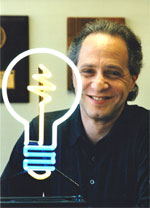 "We're well down that path," Kurzweil says. "This is not some future vision. It's gonna take a long time to finish this project... I think it's a conservative analysis to say that we will have reverse-engineered the human brain and understood its principles of operation within 25 years."
"We're well down that path," Kurzweil says. "This is not some future vision. It's gonna take a long time to finish this project... I think it's a conservative analysis to say that we will have reverse-engineered the human brain and understood its principles of operation within 25 years."
With that completed, Kurzweil forecasts that by 2029, $1,000 of computation will be 1,000 times more powerful than the human brain, virtual reality will allow you to be any person, age or sex you want, and small, cell-sized "nanobots" can be placed in the body to fight and prevent diseases. ![]() [DOWNLOAD AUDIO: "Early Cyborgs" 507KB]"So when you run into a human in the year 2035 or 2040-- a normal, biological human-- they'll have non-biological electronic computerized processes going inside their brain. You can actually meet these people today. The FDA approved a neural implant for Parkinson's [patients] that actually replaces the corpus of cells destroyed by that disease, and so those people are early cyborgs... they have a computer in their brain and they have their biological processes."
[DOWNLOAD AUDIO: "Early Cyborgs" 507KB]"So when you run into a human in the year 2035 or 2040-- a normal, biological human-- they'll have non-biological electronic computerized processes going inside their brain. You can actually meet these people today. The FDA approved a neural implant for Parkinson's [patients] that actually replaces the corpus of cells destroyed by that disease, and so those people are early cyborgs... they have a computer in their brain and they have their biological processes."
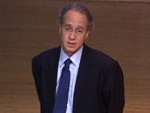 Kurzweil displayed charts which showed the rapid increases in change and technology mirrored in other areas, including economic growth ("When a recession is over, in even the Great Depression, the curve snaps back to where it would have been had it never occurred in the first place":
Kurzweil displayed charts which showed the rapid increases in change and technology mirrored in other areas, including economic growth ("When a recession is over, in even the Great Depression, the curve snaps back to where it would have been had it never occurred in the first place": ![]() [DOWNLOAD AUDIO: "Kurzweil on Recessions" 473KB]) and life expectancy.
[DOWNLOAD AUDIO: "Kurzweil on Recessions" 473KB]) and life expectancy. ![]() [DOWNLOAD AUDIO: "Life Expectancy" 571KB] "In the 18th century, every year we added a few days to human life expectancy. In the 19th century, every year we added a few weeks... We're now adding 3 months every year to human life expectancy. We're really in the very early stages of this biotechnology revolution. Ten years from now, when these technologies are really in full force, many observers including myself believe that we will add more than a year every year to human life expectancy, so as you go forward a year, your life expectancy will move out away from you."
[DOWNLOAD AUDIO: "Life Expectancy" 571KB] "In the 18th century, every year we added a few days to human life expectancy. In the 19th century, every year we added a few weeks... We're now adding 3 months every year to human life expectancy. We're really in the very early stages of this biotechnology revolution. Ten years from now, when these technologies are really in full force, many observers including myself believe that we will add more than a year every year to human life expectancy, so as you go forward a year, your life expectancy will move out away from you."
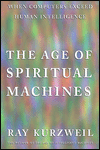 Ray Kurzweil was the principal developer of the first omni-font optical character recognition, the first print-to-speech reading machine for the blind, the first CCD flat-bed scanner, the first text-to-speech synthesizer, the first music synthesizer capable of recreating the grand piano and other orchestral instruments, and the first commercially marketed large vocabulary speech recognition. Kurzweil has received numerous awards, including the $500,000 Lemelson-MIT Prize, the world's largest award in invention and innovation, and the 1999 National Medal of Technology, the nation's highest honor in technology. His books include The Age of Spiritual Machines: When Computers Exceed Human Intelligence, which has been published in nine languages, and The Age of Intelligent Machines, which was named Best Computer Science Book of 1990.
Ray Kurzweil was the principal developer of the first omni-font optical character recognition, the first print-to-speech reading machine for the blind, the first CCD flat-bed scanner, the first text-to-speech synthesizer, the first music synthesizer capable of recreating the grand piano and other orchestral instruments, and the first commercially marketed large vocabulary speech recognition. Kurzweil has received numerous awards, including the $500,000 Lemelson-MIT Prize, the world's largest award in invention and innovation, and the 1999 National Medal of Technology, the nation's highest honor in technology. His books include The Age of Spiritual Machines: When Computers Exceed Human Intelligence, which has been published in nine languages, and The Age of Intelligent Machines, which was named Best Computer Science Book of 1990.
Kurzweil told the 361° gathering that, for some people in the world, advances in technology create "profound anxiety" that can impact society. ![]() [DOWNLOAD AUDIO: "Technology & 9/11" 708KB] "We see it in various reactions, some of which are violent. September 11th is an example, in my mind, of an attempt, a profoundly misguided one, to revert to an earlier time, to stop and even turn back progress and then harness technology for its destructive potential.
[DOWNLOAD AUDIO: "Technology & 9/11" 708KB] "We see it in various reactions, some of which are violent. September 11th is an example, in my mind, of an attempt, a profoundly misguided one, to revert to an earlier time, to stop and even turn back progress and then harness technology for its destructive potential. 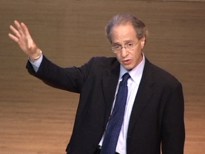 And that's something that we have to be very mindful of," he said. (BONUS CLIP:
And that's something that we have to be very mindful of," he said. (BONUS CLIP: ![]() [DOWNLOAD AUDIO: "Bioterrorism" 294KB])
[DOWNLOAD AUDIO: "Bioterrorism" 294KB])
While some might yearn for "the good old days," Kurzweil says there was really no such time. ![]() [DOWNLOAD AUDIO: "Then & Now" 822KB] "If you were to describe today to people 200 years ago, they would say 'It's mad to take such risks, to have enough atomic explosive power to end all life on Earth.' They might decide not to go forward, but they didn't really have that choice, and we don't have it today. And conversely, if you asked people today, 'How would you like to go back 200 years?' a lot of people might say, 'Yeah, that was quite a romantic time.' But if you really look at what life was like, [the] average life span was 37 years, 99% of the human race lived on the precipice of disaster, [it was] extremely labor intensive, poverty-filled, disease-prone.
[DOWNLOAD AUDIO: "Then & Now" 822KB] "If you were to describe today to people 200 years ago, they would say 'It's mad to take such risks, to have enough atomic explosive power to end all life on Earth.' They might decide not to go forward, but they didn't really have that choice, and we don't have it today. And conversely, if you asked people today, 'How would you like to go back 200 years?' a lot of people might say, 'Yeah, that was quite a romantic time.' But if you really look at what life was like, [the] average life span was 37 years, 99% of the human race lived on the precipice of disaster, [it was] extremely labor intensive, poverty-filled, disease-prone. 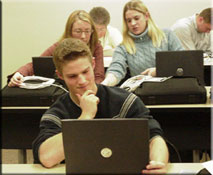 We've liberated ourselves from a lot of these difficulties and we still have a lot more liberation to go... there's still a lot of suffering in the world, and that's what propels these technologies forward," Kurzweil noted.
We've liberated ourselves from a lot of these difficulties and we still have a lot more liberation to go... there's still a lot of suffering in the world, and that's what propels these technologies forward," Kurzweil noted.
Created with a $20 million grant from Lilly Endowment in March of 2001, the 361° initiatives are designed to prepare DePauw alumni, students, faculty members, and staff to provide the creativity and leadership required by the digital age. 361° is designed to make the DePauw experience "more than full circle," equipping students with high-tech skills along with the classic critical thinking the University has taught for generations. You can learn more by clicking here.
Back